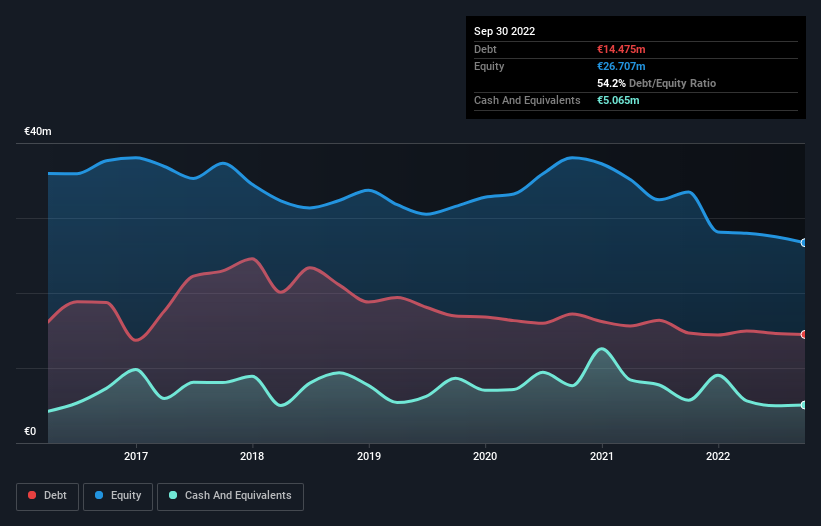
David Iben put it well when he said, 'Volatility is not a risk we care about. What we care about is avoiding the permanent loss of capital.' When we think about how risky a company is, we always like to look at its use of debt, since debt overload can lead to ruin. As with many other companies Nordecon AS (TAL:NCN1T) makes use of debt. But is this debt a concern to shareholders?
When Is Debt A Problem?
Debt is a tool to help businesses grow, but if a business is incapable of paying off its lenders, then it exists at their mercy. If things get really bad, the lenders can take control of the business. However, a more usual (but still expensive) situation is where a company must dilute shareholders at a cheap share price simply to get debt under control. By replacing dilution, though, debt can be an extremely good tool for businesses that need capital to invest in growth at high rates of return. The first thing to do when considering how much debt a business uses is to look at its cash and debt together.
See our latest analysis for Nordecon
What Is Nordecon's Net Debt?
The chart below, which you can click on for greater detail, shows that Nordecon had €14.5m in debt in September 2022; about the same as the year before. However, because it has a cash reserve of €5.07m, its net debt is less, at about €9.41m.

A Look At Nordecon's Liabilities
According to the last reported balance sheet, Nordecon had liabilities of €112.1m due within 12 months, and liabilities of €11.1m due beyond 12 months. Offsetting this, it had €5.07m in cash and €61.2m in receivables that were due within 12 months. So it has liabilities totalling €56.9m more than its cash and near-term receivables, combined.
This deficit casts a shadow over the €26.5m company, like a colossus towering over mere mortals. So we definitely think shareholders need to watch this one closely. After all, Nordecon would likely require a major re-capitalisation if it had to pay its creditors today. There's no doubt that we learn most about debt from the balance sheet. But ultimately the future profitability of the business will decide if Nordecon can strengthen its balance sheet over time. So if you want to see what the professionals think, you might find this free report on analyst profit forecasts to be interesting.
Over 12 months, Nordecon reported revenue of €319m, which is a gain of 11%, although it did not report any earnings before interest and tax. We usually like to see faster growth from unprofitable companies, but each to their own.
Caveat Emptor
Importantly, Nordecon had an earnings before interest and tax (EBIT) loss over the last year. Indeed, it lost €2.0m at the EBIT level. Considering that alongside the liabilities mentioned above make us nervous about the company. It would need to improve its operations quickly for us to be interested in it. For example, we would not want to see a repeat of last year's loss of €8.2m. And until that time we think this is a risky stock. There's no doubt that we learn most about debt from the balance sheet. But ultimately, every company can contain risks that exist outside of the balance sheet. For instance, we've identified 4 warning signs for Nordecon (2 are a bit concerning) you should be aware of.
When all is said and done, sometimes its easier to focus on companies that don't even need debt. Readers can access a list of growth stocks with zero net debt 100% free, right now.
Valuation is complex, but we're here to simplify it.
Discover if Nordecon might be undervalued or overvalued with our detailed analysis, featuring fair value estimates, potential risks, dividends, insider trades, and its financial condition.
Access Free AnalysisHave feedback on this article? Concerned about the content? Get in touch with us directly. Alternatively, email editorial-team (at) simplywallst.com.
This article by Simply Wall St is general in nature. We provide commentary based on historical data and analyst forecasts only using an unbiased methodology and our articles are not intended to be financial advice. It does not constitute a recommendation to buy or sell any stock, and does not take account of your objectives, or your financial situation. We aim to bring you long-term focused analysis driven by fundamental data. Note that our analysis may not factor in the latest price-sensitive company announcements or qualitative material. Simply Wall St has no position in any stocks mentioned.
About TLSE:NCN1T
Nordecon
Operates as a construction company in Estonia, Sweden, Finland, Ukraine, Latvia, and Lithuania.
Adequate balance sheet with acceptable track record.
Similar Companies
Market Insights
Community Narratives



